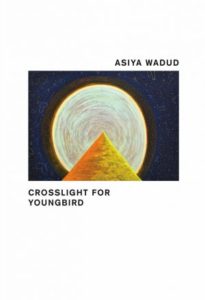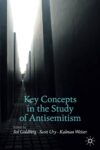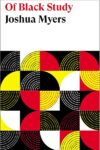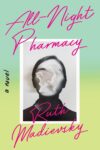 [Nightboat Books; 2018]
[Nightboat Books; 2018]
As a musical association based in naming, poetry exists somewhere between movement and monument, image and voice. Perhaps for this reason, poems remain a storied vehicle of witness, however complicated their relationship to narrative. Asiya Wadud’s debut collection, Crosslight for Youngbird, both suits and complicates this vocation, gathering poems of bodies and bodies of water, canvassing states of transit and migrancy as a call to justice for those dispossessed.
Minerva’s owl, to adapt Hegel’s famous maxim, takes to the skies at European twilight; likewise, however differently, Wadud’s Youngbird is a flighted witness to the ends of empire, only one who flies by day, decrying horror and extending care. In the opening poem, ‘home 16 ways,’ Youngbird is not a quiescent overseer but an agent of delivery and deliverance alike, who metamorphoses accordingly; to Newbird, Everybird, icons of ancestral memory and cultural resilience. “Everybird has a God. Everybird has a compass in its brain.”
Throughout these poems, Wadud surveys vistas of possibility. This vision, however, begins in the darkness of our present world, in scenes of confinement and displacement. Wadud writes of the will to survival, in citation of and contrast to the language of reportage on the refugee “crisis” in Central and Mediterranean Europe. Her prose poems put names to the horror of the headlines. “You can say their names,” Wadud exhorts the reader, and she does:
Her name was Lida. From the family of Rahm. Someone loved the baby and boarded her on a northbound lorry. They began their journey in Röszke. Revved the engine maybe, standing room only, undoubtedly. The man at the wheel, Mitko, I wonder where he keeps his own humanity. Tucked in a hull abut his neat steady breathing. Maybe a wallet photo of his own mother to remind him he’s still breathing. Shame he won’t extend outstretched to the 71 asphyxiating.
Wadud’s endnotes clarify this number in its terrible specificity, referring to the deaths of 71 migrants from Iraq, Syria and Afghanistan, whose bodies were discovered in a truck in Austria in summer 2016. Lida Rahm, the poem’s dedicated namesake, was less than a year old at the time of her death, and Wadud elevates her as a living principle. But names work in two directions, commemorating and condemning, where Wadud invokes the driver quoted in the article by his first name, Mitko; a Bulgarian involved in human trafficking who, having sealed his human cargo in an airtight trailer, fled the scene days prior to its gruesome discovery.
Mitko’s humanity is not questioned so much as summoned by this text, called to consistency before the intimate relationships prefiguring conscience: “What did he ever think of his mother?” The recurrent pang of this refrain serves a rhetorical interrogation, as forgetfulness of family appears requisite to such gruesome terms of employment. Where the horror of this event concerns the treatment of human beings as cargo, Wadud’s insistence on names and relations reparatively contrasts the natal alienation of the Middle Passage as a paradigm of privation. Likewise, the name is not simply a facet of the individual, convoking human dignity, but doubles as an alienating apparatus in its enumerative parceling of identity. Wadud speaks of the “Papers that name them. Maybe Aamir. Maybe Hassan. Maybe empire.” Imperial paperwork becomes a kind of cenotaph; capable of holding but not loving.
In Wadud’s poetry, by comparison, language is not a post facto effect of power but a matter of involvement: “Didn’t they all know the world as it was named?” This everyday conversancy in worldly things is foreclosed by the murdering state and its hapless intermediaries, agents of carelessness:
What kind of man drives a truck across the border forgetting his own mother? With each breath Mitko took could he not then name them? Name the diminished breaths of the 71? With each breath Mitko took could he not remember in his lorry some who loved the sun? Some like Lida who maybe yet to know the sun? Some like her toddler brother dying to show her the sun? Some like her mother who always seeks out the supple sun.
The rhymed sentences concluding this paragraph insist on a common orbit, connecting human endeavor to the sun—a stable beneficence from which some are nonetheless sequestered, and to which others are violently exposed. Earth’s star becomes a potent metaphor, a sign of universality and of neglectful indifference depending on one’s vantage. This postulate, of a basic codependency, underwrites the poem’s view on history and its participants.
In this spirit Wadud adapts Rainer Maria Rilke’s poem, ‘Widening Circles,’ using its two stanzas to bookend a rumination on memory and migration. This citational scaffold is felicitous, for the concentric spheres of experience that Rilke describes have their own time scales and pose questions of subjective consistency:
I’ve been circling for thousands of years
and I still don’t know: am I a falcon,
a storm, or a great song?
An existential uncertainty not only attends any bird’s being-in-flight, but echoes in the book’s epigram, from Derek Walcott’s long poem ‘The Schooner Flight’: “either I’m nobody, or I’m a nation.” The speaker of Walcott’s poem departs postcolonial Trinidad on an Odyssean mandate, gradually becoming ocean, as a possible allegory of stranding between national identities and outside of history.
“I’m a good swimmer, I’ve always lived by the sea.” A speaker named Omar repeats variations on this mantra as though to reassure himself throughout the diptych ‘conversations from empire,’ in which a pair of attributed voices contrast border violence in contemporary Europe with the more familiar genre of Holocaust memoir. The speaker Omar’s sojourn is insusceptible to analogy, much less allegory, however, and his soliloquy is more testimonial than monomythic:
Now, I have always loved the sea. I save whom I can. A baby be damned without a mother. A mother be damned without her child. A man be damned without a country. A country be damned without a people. A nation of no one trickle north and the long arm of empire it whips back. I am a good swimmer, I’ve always loved the sea.
Wadud’s prose forms around an emphatic refrain, a central insistence that gathers text around it like a pulled thread. These poems are deceptively monologic in appearance, as every speaker implicates myriad other voices corresponding to position. This polyvocality makes ‘Youngbird, highwater home’ a biographical sketch of historical depth, as the poet situates herself amid the same traumatic processes as her sympathetic subjects, refugees and seekers in the wake of history.
“I was born poor and black just below the Mason-Dixon line where a just God justified all my light inside,” the poem begins, and a credulity of country proceeds from an ancestry of the dispossessed: “What you see in me and don’t see the same country? What in my face don’t say English mother tongue. What you see and don’t see slave marooned? What at seven I’m dying for a sliver of country. And my mother says this country never gave us anything.” The interrogative base of these sentences contrasts the punctuation, alternating questions and doubtful replies. These foundational experiences, intergenerational and sedimented into expectation, map a history of migration onto the individual person: “My only papers my own mouth incant my Middle passage route,” the poet reports after a lost passport forces the matter of documentation.
Ultimately, a higher and more basic power eludes the jurisdiction of the nation-state: “You want some country just count your brethren,” the poem’s mother counsels, and this writing declares the society of those dispossessed with the sun itself, a life force overruling law and rising over the sea:
I love a country and warm to most borders. I love a country that abuts some sun. Me, I’m just free. And anyway, know a country’s levee will always breach a border. So pass through a ready sieve some what you need to make a little country by the supple, giving sea.
As the current of this writing insists upon a common element, falsifying “fickle” borders, the scenery of these poems is arrayed between earth and sky and other corresponding terms; between a named God and a struggling humanity; between sun and non-citizen; between a glaring sovereign and the sovereignty of kin. However closely these recurrent terms appear to correspond to philosopher Martin Heidegger’s fourfold architecture of ‘dwelling’ — an attunement that transpires between both ground and gaze, human community and transcendental guarantor — Wadud’s description offers a deep critique of Heidegger’s sedentary ethnocentrism, championing life within the liminal and horizonal axis of this sketch.
In this respect Wadud’s poetry extends a challenge that Simone White issues in a wide-ranging essay on Amiri Baraka’s program of Black music as first philosophy. In Digging, White quotes, Baraka sets forth a passage by W.E.B. DuBois that he holds to be paradigmatic of the radical Black tradition, which in its essence “combines the material social world with and as the origins of Art. The Earth & the Sky.” Heidegger resounds in this quotation, and for Baraka, too, the sun is the mediating figure of terrestrial betweenness: “the sun is what keeps this planet alive, including the Music, like we say, the Soul of which is Black.”
White pursues this thought vigorously through the work of Fred Moten and Nathaniel Mackey to arrive at and eventually bypass Heidegger, whom she refuses “the position of primary interlocutor with respect to betweenness.” “A lot of motherfuckers say almost exactly the same words about the philosophically oriented gesture that is willful cutting into what exists ‘between earth and sky,’ heaven and earth, sky and earth,” White notices, whilst disputing the primacy of music to many such descriptions.
Nonetheless, this phenomenological commonplace would appear to describe something of how being is disclosed to its subjects, in their resiliency and susceptibility alike. Surely the “upward glance” of which Heidegger speaks, for which perceptual cause the sky faces the earth and vice versa, traverses light and is a gift of light; and Wadud’s close identification of her poetic personae with the light — of survival with the sun and of community with stellar constellation—places this poetry in rewarding conversation with all of the aforementioned.
This particular figuration of betweenness not only contrasts earthly transit, and the limbo thrust upon anyone attempting passage of a treacherous terrain or imporous border; it establishes a transcendent community on a vertical axis that at every moment exceeds and extends the horizontal plane upon which nations mark jurisdiction. “All light is a desire line,” Wadud writes, subjectively affirming the power that political violence truncates.
In Wadud’s writing, this elemental betweenness renders humanity susceptible to both otherness and harm, for the elements upon which we depend are mortally interchangeable, as in the poem ‘2:1’: “Drowning is the act of water displacing air in the lungs.” This “act of water” is never so disinterested, however—this is a mechanical description of what political violence selectively inflicts, where even something so vitally innocuous as the air we breathe is territorialized accordingly: “The air in here? That’s a security. The air in here carries a blue passport.” As a matter of conviction, Wadud presents a vulnerabilizing writing of the deeper continuum in which human beings occur.
Two complementary metaphors structure the sweep of the book, one spanning under and one soaring above each buoyant raft of text. Throughout these poems, an oceanic insistence underscores scenes of political and personal contingency: “The tides come and go and the doom and resolve each keep their own metronome.”
In the poem ‘young warblers, golden plovers, loons,’ a January walk along the beach commemorates the due date of a miscarried child, who remains submersed in memory: “Little bear, you spent 77 days with your own black thoughts, chasing a scythe, a sickle, a sepulcher, a sentry. You spent all those days chasing your own slippery tail, fishing for carrion.” This is another figure of loss at sea, intimate to the body. An incantatory catalogue poem, ‘my little nothings form a mouth,’ follows immediately, recalling scenes of pre-personal development:
I’m remembering when I was a newborn
Fresh and feral born head first and nearly jaundiced
Caully frog legged and liminal
Amphibious figures of infancy bookend sentences of transubstantiation; “I’m a kitten and I’m nursing … I’m a dog I’m laughing … I’m a moon and I’m waxing.” These poems — of personal, often painful, implication in the variousness of being — form a crucial complement to the works of political mourning in the first half of the book.
A multi-vocal centrepiece, ‘testament, a litany for many voices,’ is written for an integrated trinity of positions — GOD (“alternately rancor and love”), ALL (“reciprocated rancor, the greenest pastures, embodied doubt”), and SOLO, a specialization of preceding voices and perspectives (“shirked, embodied doubt, reluctant belief”). As in earlier poems, where “God’s will is ascendant,” God figures here as both a direction and a disposition, establishing a vertical relationship of direct transcendence. The choric All appears bereft but never doubtful:
No harbor no beacon God’s silent when he’s
speaking, unfettered and too far from home
A call-and-answer between the solo voices and that of God, whose second-person refrain repeats amid a plurality of theses and propositions (“He is, he is not”) conveys ambivalence. This oscillatory self-consistency corresponds as much to gnostic mystery as to an infant’s experience of a caregiver on a binary model of presence and absence, and a Thalassic mise-en-scène buoys this meditation on a flickering beacon, faith in which manifests a “sea wall fortifying and strong” and as a “flood of limitless love.” God figures as both an overwhelming sea surge and a cordoning embankment, and, as a soloist asserts, his subjects are as contradictory unto themselves:
We are bobbing in an amniotic sea
We are all ancient mariners
And we have our wings
At once aqueous and flighted, the poem’s subject spans two elements. Wadud registers this dual provenance again as domestic metaphor, where the chorus asserts their faith to function as both door and window; a port of entry and a looking out. “Belief is never wholly concrete never complete/Ephemeral always doubting replete and wrangling to be free.”
The civic-minded vignettes to follow depend upon many of the same oracular effects as this grand lamentation; in ‘ _____, always,’ a home-poem of praise, a six-line stanza repeats with the insistence of a blues or courtly supplication, until the final stanza breaks with musical expectation, weaving together preceding language and extolling solitude.
A list poem, ‘this is a library,’ inventories public space with storybook patience; a survey of the many purposes that converge upon a given space. ‘clean heart’ transpires admiringly in the idiom of love song, and its optimistic vistas converge upon the tempestuous imagery of the book and its master metaphors:
I look to the east and a search the west
for the best the sea can give
I know its full of mollusks and scallops
and young birds that are waiting for a home
for new birds who need good homes
The many returns of this text are as the tide; rhythmic and thematic assurances that measure experience, however distantly. Throughout, Wadud counterposes figures of universality to the specificities of flight, upending the vertical tension between God and his subjects, as those struggling to survive upon the earth look to the beaming generality of the sun. The reversibility of this figuration produces not so much the “primal oneness” of which Heidegger speaks, in the sense that “‘on the earth’ already means ‘under the sky’”—rather, Wadud supplants the fanatical thought of place with a supple spatial awareness, implicitly asserting the integrity in transit of the seeking and displaced.
However philosophically deft, these lyrics chart a worldly attentiveness, performing mourning and preserving life, and their solidarities are modelled on loving ritual. In the penultimate prose poem of the collection, Wadud describes a family playing on the beach:
Now, I am squinting straight into the sun and no one is there except we three. We three are a small nation, all eyes closing and a peace so peaceful and a water so still and waveless beckoning what’s reckless as it washes over our forearms … We’re all bobbing creatures amniotic salted on this island of deserted windmills. No one has even thought of the children at all. The children don’t care much if they are burning under the sun, at least not for this moment.
In a context of freedom and play, the poem’s children are entrusted rather than abandoned to the elements, its speaker buoyed in a saline cradle. These concluding paragraphs contrast the forced flight depicted at the outset, but this suspension of concern arrives only after a sustained acknowledgment of life’s exposure to disaster. Wadud’s poems of witness are far less remote than one might expect of an often commemorative tradition, underwritten by a deep physical sympathy. Scenes of relative leisure and political limbo converge upon the same scenery and metaphor, and this base makes emotionally salient the real and particular violence of imaginary borders. In this, Crosslight for Youngbird not only conveys its reader to a present urgency but a necessary future, as the infant sea and arcing sky together write horizon.
Cam Scott is a poet, essayist, and improvising non-musician from Winnipeg, Canada, Treaty One territory. He performs under the name Cold-catcher and writes in and out of Brooklyn.
This post may contain affiliate links.







